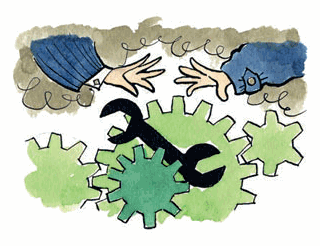|
|
Green protectionism
Nov 15th 2007
From The Economist print edition
A dangerous flaw in a bill to control carbon emissions
Illustration by Claudio Munoz
①FOR those (such as this newspaper) who argue that the only way to avert dangerous climate change is to set a price on CO2 emissions, what's going on in America's Congress is excellent news. A bill to set such a price has achieved a remarkable degree of cross-party support . ②Federal emissions controls in America are essential to tackling climate change globally. So it is especially unfortunate that the bill includes a provision that would turn the fight against climate change into a tool for protectionists.
While Al Gore has been strutting his stuff on stage, ③behind the scenes America's quieter greens have been successfully lobbying powerful interests. Many companies have come round to the view that they would do better with a single federal system than a patchwork of state-level rules. Farmers have bought the idea that they can make money out of biofuels. ④Christians have been persuaded that they need to be better stewards of the earth. Defence hawks have been arguing that America needs to reduce its dependency on the Middle East. ⑤But two powerful groups have remained determinedly sceptical: energy-intensive manufacturers and organised labour, who fear the effects of higher energy costs in America and their impact on jobs.
The main purpose of the bill is to establish a carbon price through a cap-and-trade system. The proposal is a reasonable one, informed by the experience of Europe's similar scheme. ⑥But to placate the manufacturers and the unions, the bill also includes a measure which Europe has rightly abjured (although some member states have recently been demanding one) for a border tax on carbon-intensive goods. Imports would have to be certified as to their carbon content, and would be taxed accordingly.
Proponents of the idea argue, first, that American producers would otherwise be disadvantaged by the higher costs that their country's stricter standards impose on them. Second, they maintain, a tax would encourage developing-country governments to cut the carbon-intensity of their economies for fear of losing lucrative export markets.
Be green and grow
On the first argument, if America establishes a carbon price, an energy-intensive industry such as aluminium would very likely choose to expand capacity elsewhere. ⑦Yet it is not clear that, in the long run, environmental regulation does much to suppress economic growth. After all, California imposes tighter rules on companies than do most other American states, but its long boom suggests that greenery and growth can coexist comfortably.
China and India might well come more swiftly to the negotiating table if they faced the possibility of losing their export markets. But the experience of America and Europe suggests that ⑧threatening trade sanctions is not the only way to bring a country round. After all, Europe set a carbon price without imposing tariffs on American goods, and America looks like following its lead anyway. ⑨What's more, the costs of a border tax could be huge, not just because of the massive bureaucracy needed to certify the carbon content of different goods imported from different factories in different countries, but also because such a tax would be a dangerous weapon in the hands of America's growing gang of protectionists.
⑩The people who worry most about the costs of trying to constrain carbon emissions are the very ones demanding protectionist measures. But if those measures are passed, America risks something far costlier than a switch to cleaner energy: a global trade war. |
-

|